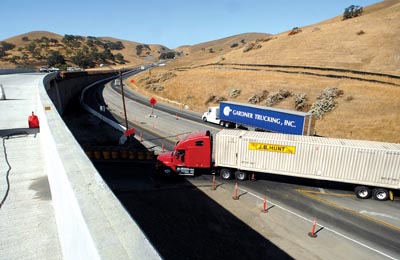
Starting in 2011, the diesel rules will speed up the replacement
of thousands of polluting trucks and buses that typically stay on
the road for decades and are not as clean as newer models that have
tougher, federally mandated emissions standards.
HOLLISTER
Supervisors have put off implementing state-mandated regulations requiring diesel-powered trucks to install a mechanism that reduces pollution.
“I think given the economic times, it should have been phased in over a longer period,” said Supervisor Reb Monaco of the regulations set forth by the California Air Resources Board. “Isn’t there some way this could have been phased in over a longer period of time?”
The measure, AB32, requires the reduction in diesel particulates in trucks. Any diesel-powered shipping trucks soon will be required to meet higher emission standards by having a centrifugal filter device that catches particulates and doesn’t release them into the environment.
Outfitting the trucks with the filters is only the first phase of the new regulations, said Monaco. The second calls for the replacement of all trucks without the diesel particulate filters.
Starting in 2011, the diesel rules will speed up the replacement of thousands of polluting trucks and buses that typically stay on the road for decades and are not as clean as newer models that have tougher, federally mandated emissions standards.
The state Air Resources Board approved the rule Friday despite warnings it could shut down many small trucking companies in the state. Many of them rely on the older, dirtier vehicles targeted by the change. The regulation also came a day after the board adopted a sweeping plan to reduce the state’s greenhouse gases, regulations that are expected to change everything from the way factories operate to the fuel Californians put in their vehicles.
San Benito County, which lacks an alternative mode of transportation for goods like produce, is forced to rely heavily on diesel-powered trucks, officials contend. The scope of these regulations is not limited just to agricultural shipping. Richard Bettencourt, a dump truck broker, said it affects “everybody” – such as the construction and farming industries.
“This isn’t just truckers,” he said.
With the already grim economic outlook for the county, the added expense could spell disaster, he said.
“It’ll put us out of business,” he said.
Monaco, who presented the item to the board, said the estimated financial impact for the trucking industry statewide is $5.5 billion. He heard from another reliable source, he said, that the estimate was low and the actual cost to the industry could be $20 billion to $30 billion, which would be devastating.
Bettencourt added that he is a member of the California Dump Truck Association and the group has lobbyists working in Sacramento with the air resources board. “It just doesn’t seem to make any difference,” he said.
Business in his industry also is down with the economy. He said dump truck drivers who have outfitted their trucks are forced to return them because of lacking work.
In its resolution, the county acknowledges the California Air Resources Board and this legislation it passed but also said that the state didn’t consider the economic consequences for rural communities such as San Benito County. Many rural California counties include large numbers of trucks that would need new equipment installed. Another troubling piece of that scenario is how many banks will not allow loans to outfit trucks more than 10 years old.
For Bettencourt’s business, none of the dump trucks he brokers have been outfitted with the new equipment.
“I don’t think anyone is going to do anything about it until they are forced to do it,” he said.
When it comes time that all trucks must be retrofitted, Bettencourt said the industry will have to “ask for increases in rates – for compliance.”
“Or there is going to be a real shortage in trucks or shortages in grocery stores.”
One of the major issues addressed in AB32 is the health concerns caused by diesel particulates. Although San Benito County does operate many diesel-powered semi trucks, the health risks proposed in the plan are significantly less here than in densely populated areas.
San Benito County would not be the first county to ask for a delay in implementation. Monaco said there has been another county that has written a similar letter to Sacramento.
Bettencourt supported the board’s action at the meeting.
“It’s an excellent thing that the board did yesterday.”
The Associated Press contributed to this report.








